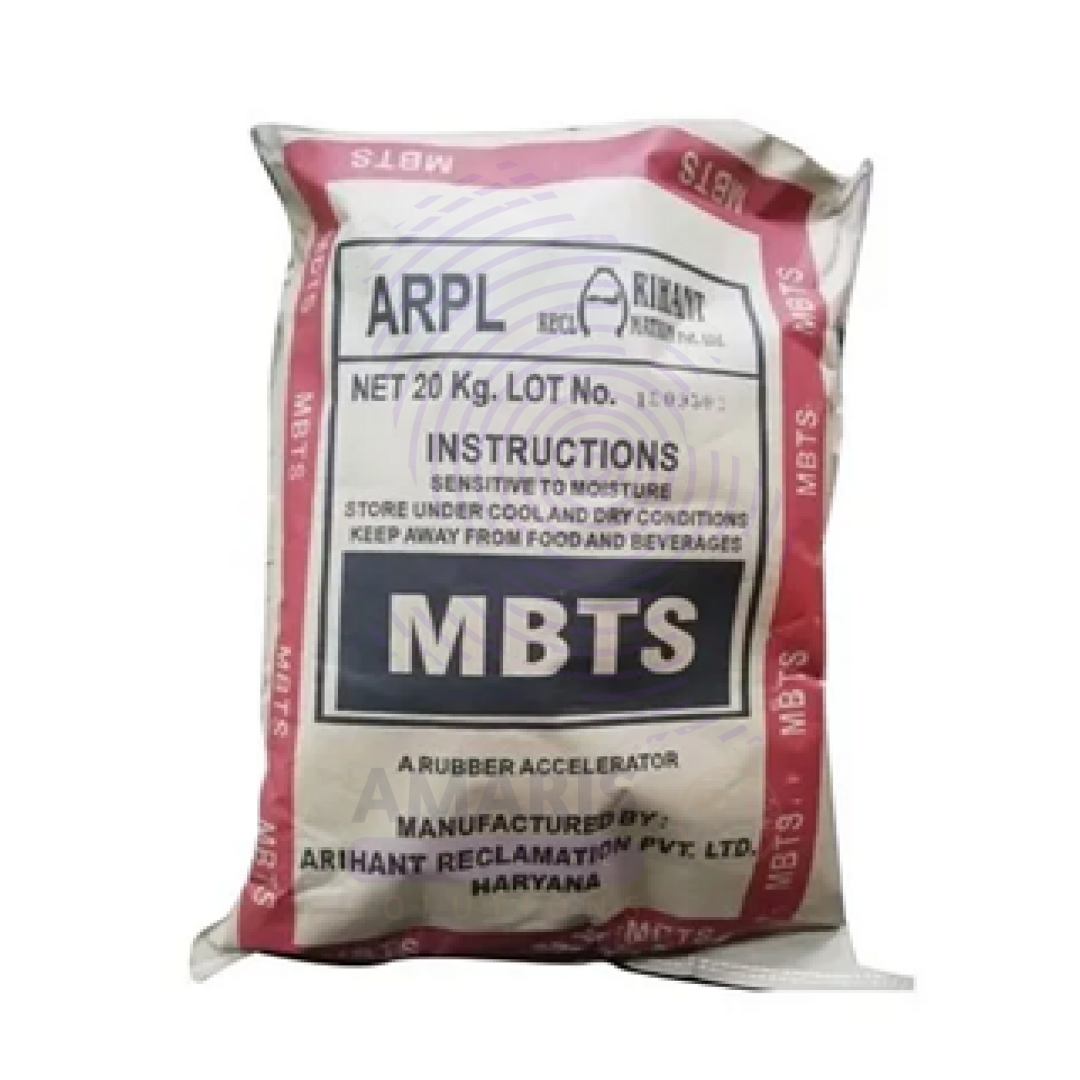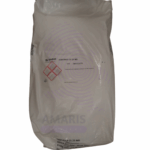Rubber Accelerator MBTS
Whatsapp Order
Rubber Accelerator MBTS (Mercaptobenzothiazole Disulfide) is a crucial chemical used in the vulcanization process of rubber. It accelerates the cross-linking of rubber molecules, enhancing the elasticity, strength, and durability of the final rubber products. MBTS is favored for its effective acceleration properties and is widely used in the production of tires, footwear, hoses, and various rubber goods.
Description
Table of Contents
Toggle
Rubber Accelerator MBTS
Primary Uses
- Rubber Industry
- Acts as a secondary accelerator in the vulcanization process of natural and synthetic rubber.
- Enhances the speed and efficiency of sulfur cross-linking to improve mechanical properties of rubber.
- Used in manufacturing automotive tires, industrial rubber goods, conveyor belts, and footwear soles.
- Adhesives and Sealants
- Incorporated in rubber-based adhesives and sealants to improve curing time and bond strength.
Secondary Uses
- Plastic and Polymer Modification
- Used in some specialty polymer formulations requiring vulcanization or cross-linking enhancements.
- Coatings and Inks
- Occasionally employed in rubber-based coatings and printing inks for improved durability and elasticity.
KEY PRODUCT FEATURES
1. Basic Identification Attributes
- Chemical Name (IUPAC): 2,2'-Dithiobis(benzothiazole)
- Common/Trade Name: Rubber Accelerator MBTS
- CAS Number: 120-78-5
- HS Code: 2924.29
- Synonyms: Mercaptobenzothiazole disulfide, MBTS, MBS
2. Physical & Chemical Properties
- Physical State: Pale yellow to off-white powder or granules
- Color & Odor: Light yellow; faint sulfur-like odor
- Solubility: Slightly soluble in water; soluble in organic solvents such as benzene and toluene
- Melting Point: 180–185°C (decomposes)
3. Safety & Hazard Attributes
- GHS Classification: Harmful if swallowed; skin sensitizer; may cause respiratory irritation
- Toxicity: Moderate toxicity; avoid inhalation and skin contact
- Exposure Limits: Follow occupational safety guidelines
4. Storage & Handling Attributes
- Storage Conditions: Store in a cool, dry, well-ventilated area away from incompatible materials like strong oxidizers
- Container Type: Sealed drums or bags, moisture-proof packaging recommended
- Shelf Life: Typically 1–2 years under proper storage
- Handling Precautions: Use personal protective equipment; avoid dust generation and inhalation
5. Regulatory & Compliance Attributes
- Complies with chemical safety regulations applicable to rubber accelerators
- Usage subject to environmental and occupational health standards
6. Environmental & Health Impact
- Biodegradability: Low biodegradability
- Ecotoxicity: Potentially toxic to aquatic life; avoid environmental release
- Bioaccumulation: Not significant
SAFETY HANDLING PRECAUTIONS
Safety Handling Precautions
- PPE Required: Gloves, goggles, dust mask or respirator, protective clothing
- Handling Guidelines: Use in well-ventilated areas; prevent dust formation; avoid skin and eye contact
- Storage Measures: Keep containers tightly closed and stored in a dry environment
First Aid Measures
- Inhalation: Move to fresh air; seek medical attention if breathing difficulty occurs
- Skin Contact: Wash thoroughly with soap and water; get medical help if irritation develops
- Eye Contact: Rinse eyes with plenty of water for 15 minutes; seek medical attention if irritation persists
- Ingestion: Rinse mouth; do not induce vomiting; seek immediate medical help
Firefighting Measures
- Fire Hazards: Combustible solid; may release hazardous fumes when burned
- Extinguishing Media: Use dry chemical, foam, CO₂, or water spray
- Special Precautions: Wear protective gear and self-contained breathing apparatus in confined spaces
- Hazardous Combustion Products: Carbon oxides, nitrogen oxides, sulfur oxides


 Preservatives(food)
Preservatives(food) Flavor Enhancers
Flavor Enhancers Acidulants
Acidulants Sweeteners
Sweeteners Antioxidants
Antioxidants Colorants(food)
Colorants(food) Nutraceutical Ingredients (food)
Nutraceutical Ingredients (food) Nutrient Supplements
Nutrient Supplements Emulsifiers
Emulsifiers
 Collectors
Collectors Dust Suppressants
Dust Suppressants Explosives and Blasting Agents
Explosives and Blasting Agents Flocculants and Coagulants
Flocculants and Coagulants Frothers
Frothers Leaching Agents
Leaching Agents pH Modifiers
pH Modifiers Precious Metal Extraction Agents
Precious Metal Extraction Agents
 Antioxidants(plastic)
Antioxidants(plastic) Colorants (Pigments, Dyes)
Colorants (Pigments, Dyes) Fillers and Reinforcements
Fillers and Reinforcements Flame Retardants
Flame Retardants Monomers
Monomers Plasticizers
Plasticizers Polymerization Initiators
Polymerization Initiators Stabilizers (UV, Heat)
Stabilizers (UV, Heat)
 Antifoaming Agents
Antifoaming Agents Chelating Agents
Chelating Agents Coagulants and Flocculants
Coagulants and Flocculants Corrosion Inhibitors
Corrosion Inhibitors Disinfectants and Biocides
Disinfectants and Biocides Oxidizing Agents
Oxidizing Agents pH Adjusters
pH Adjusters Scale Inhibitors( water)
Scale Inhibitors( water)
 Antioxidants(cosmetic)
Antioxidants(cosmetic) Emollients
Emollients Fragrances and Essential Oils
Fragrances and Essential Oils Humectants
Humectants Preservatives
Preservatives Surfactants(cosmetic)
Surfactants(cosmetic) Thickeners
Thickeners UV Filters
UV Filters
 Fertilizers
Fertilizers Soil Conditioners
Soil Conditioners Plant Growth Regulators
Plant Growth Regulators Animal Feed Additives
Animal Feed Additives Biostimulants
Biostimulants Pesticides (Herbicides, Insecticides, Fungicides)
Pesticides (Herbicides, Insecticides, Fungicides)
 Active Pharmaceutical Ingredients (APIs)
Active Pharmaceutical Ingredients (APIs) Excipients
Excipients Solvents(pharmaceutical)
Solvents(pharmaceutical) Antibiotics
Antibiotics Antiseptics and Disinfectants
Antiseptics and Disinfectants Vaccine Adjuvants
Vaccine Adjuvants Nutraceutical Ingredients (pharmaceutical)
Nutraceutical Ingredients (pharmaceutical) Analgesics & Antipyretics
Analgesics & Antipyretics
 Analytical Reagents
Analytical Reagents Solvents(lab)
Solvents(lab) Chromatography Chemicals
Chromatography Chemicals Spectroscopy Reagents
Spectroscopy Reagents microbiology-and-cell-culture-reagents
microbiology-and-cell-culture-reagents Molecular Biology Reagents
Molecular Biology Reagents Biochemical Reagents
Biochemical Reagents Inorganic and Organic Standards
Inorganic and Organic Standards Laboratory Safety Chemicals
Laboratory Safety Chemicals Specialty Laboratory Chemicals(Special Laboratory Equipment)
Specialty Laboratory Chemicals(Special Laboratory Equipment)
 Demulsifiers
Demulsifiers Hydraulic Fracturing Fluids
Hydraulic Fracturing Fluids Scale Inhibitors(oil)
Scale Inhibitors(oil) Surfactants(oil)
Surfactants(oil) Drilling Fluids
Drilling Fluids
 Dyes and Pigments
Dyes and Pigments Bleaching Agents
Bleaching Agents Softening Agents
Softening Agents Finishing Agents
Finishing Agents Antistatic Agents
Antistatic Agents
 Admixtures
Admixtures Waterproofing Agents
Waterproofing Agents Sealants and Adhesives
Sealants and Adhesives Curing Compounds
Curing Compounds Concrete Repair Chemicals
Concrete Repair Chemicals Anti-Corrosion Coatings
Anti-Corrosion Coatings
 Surfactants(cleaning)
Surfactants(cleaning) Builders
Builders Enzymes
Enzymes Solvents (Cleaning)
Solvents (Cleaning) Fragrances
Fragrances
 Electronic Chemicals
Electronic Chemicals Catalysts
Catalysts Lubricants
Lubricants Photographic Chemicals
Photographic Chemicals Refrigerants
Refrigerants Automotive chemicals
Automotive chemicals Pyrotechnic Chemicals
Pyrotechnic Chemicals
 Biodegradable Surfactants
Biodegradable Surfactants Bio-based Solvents
Bio-based Solvents Renewable Polymers
Renewable Polymers Carbon Capture Chemicals
Carbon Capture Chemicals Wastewater Treatment Chemicals
Wastewater Treatment Chemicals
 Pigments
Pigments Solvents(paint)
Solvents(paint) Specialty Coatings
Specialty Coatings Binders/Resins
Binders/Resins Additives
Additives Driers
Driers Anti-Corrosion Agents
Anti-Corrosion Agents Functional Coatings
Functional Coatings Application-Specific Coatings
Application-Specific Coatings
 Leavening Agents
Leavening Agents Dough Conditioners
Dough Conditioners Flour Treatments
Flour Treatments Fat Replacers
Fat Replacers Decoratives
Decoratives Preservatives(baking)
Preservatives(baking)
 Plasticizers & Softeners
Plasticizers & Softeners Reinforcing Agents
Reinforcing Agents Adhesion Promoters
Adhesion Promoters Vulcanizing Agents
Vulcanizing Agents Antidegradants
Antidegradants Blowing Agents
Blowing Agents Fillers & Extenders
Fillers & Extenders Accelerators & Retarders
Accelerators & Retarders


















